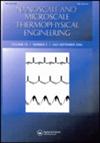由磷磷脂等离子体拓扑跃迁介导的纳米图案黑色磷磷脂的近场热辐射
IF 2.7
3区 工程技术
Q2 ENGINEERING, MECHANICAL
Nanoscale and Microscale Thermophysical Engineering
Pub Date : 2019-02-13
DOI:10.1080/15567265.2019.1578310
引用次数: 23
摘要
新兴的黑磷烯(BP)具有很强的面内各向异性和可调性,在近场热辐射介质中具有独特的优势,但与其他领域的广泛关注形成鲜明对比,相关研究很少报道。在这里,我们考虑了不同的模式和电子掺杂方式,研究了纳米BP的近场热辐射。适当的掺杂增加了自由载流子密度,使BP从介电介质向双曲材料转变,激发了等离子体共振。由于磷烯带等离子体从准椭圆到准双曲线的拓扑跃迁,研究发现,与平面等离子体相比,纳米模式BP具有高达65%的辐射传输率。这项工作开辟了调解和增强近场热辐射的替代途径,在有效的热管理和能量转换方面具有广阔的应用前景。本文章由计算机程序翻译,如有差异,请以英文原文为准。
Near-Field Thermal Radiation of Nanopatterned Black Phosphorene Mediated by Topological Transitions of Phosphorene Plasmons
ABSTRACT Emerging black phosphorene (BP) has unique advantages in mediating near-field thermal radiation due to its strong and tunable in-plane anisotropy, but relative researches are rarely reported in stark contrast to its gained tremendous attention in other fields. Here, we investigate near-field thermal radiation of nanopatterned BP considering different ways of patterning and electronic doping. Appropriate doping increases free carrier density, enabling the transition of BP from dielectrics to hyperbolic materials and the excitation of plasmon resonances. Nanopatterned BP is found to possess a higher radiative transfer rate by as high as 65% compared with plane counterparts due to topological transition of phosphorene ribbon plasmons from quasi-ellipses to quasi-hyperbolas. This work opens alternative routes to mediate and enhance near-field thermal radiation, which has promising applications in efficient thermal management and energy conversion.
求助全文
通过发布文献求助,成功后即可免费获取论文全文。
去求助
来源期刊

Nanoscale and Microscale Thermophysical Engineering
工程技术-材料科学:表征与测试
CiteScore
5.90
自引率
2.40%
发文量
12
审稿时长
3.3 months
期刊介绍:
Nanoscale and Microscale Thermophysical Engineering is a journal covering the basic science and engineering of nanoscale and microscale energy and mass transport, conversion, and storage processes. In addition, the journal addresses the uses of these principles for device and system applications in the fields of energy, environment, information, medicine, and transportation.
The journal publishes both original research articles and reviews of historical accounts, latest progresses, and future directions in this rapidly advancing field. Papers deal with such topics as:
transport and interactions of electrons, phonons, photons, and spins in solids,
interfacial energy transport and phase change processes,
microscale and nanoscale fluid and mass transport and chemical reaction,
molecular-level energy transport, storage, conversion, reaction, and phase transition,
near field thermal radiation and plasmonic effects,
ultrafast and high spatial resolution measurements,
multi length and time scale modeling and computations,
processing of nanostructured materials, including composites,
micro and nanoscale manufacturing,
energy conversion and storage devices and systems,
thermal management devices and systems,
microfluidic and nanofluidic devices and systems,
molecular analysis devices and systems.
 求助内容:
求助内容: 应助结果提醒方式:
应助结果提醒方式:


